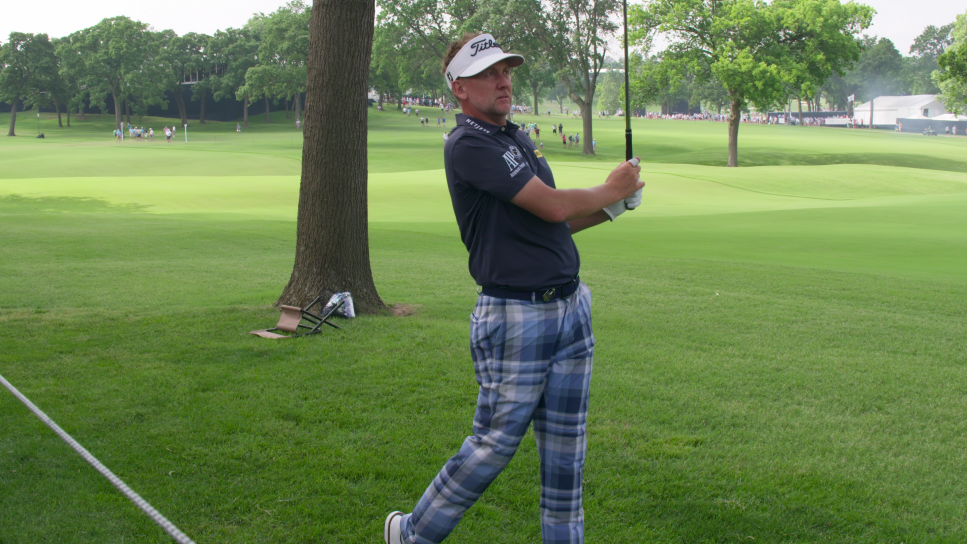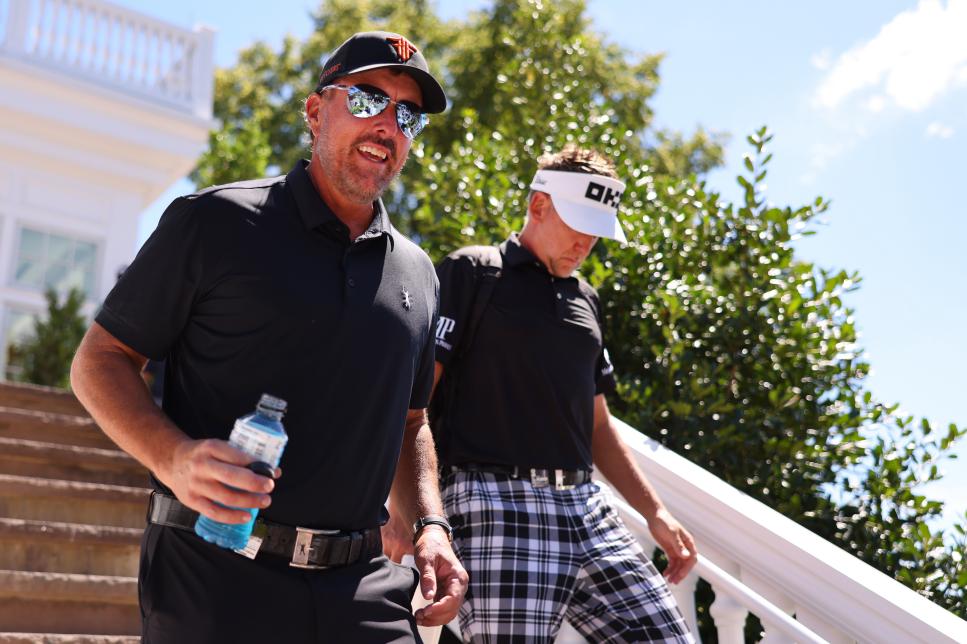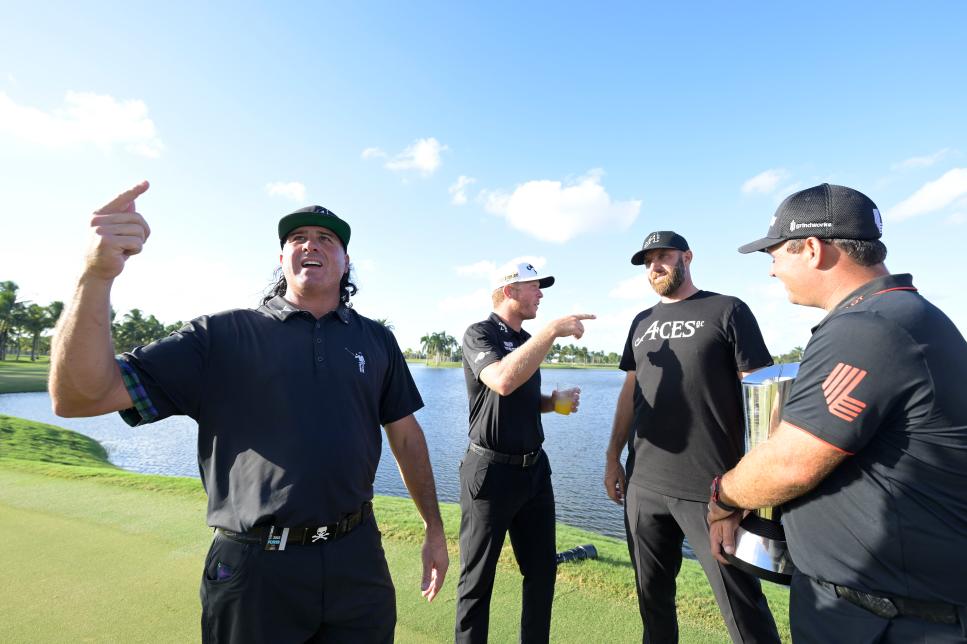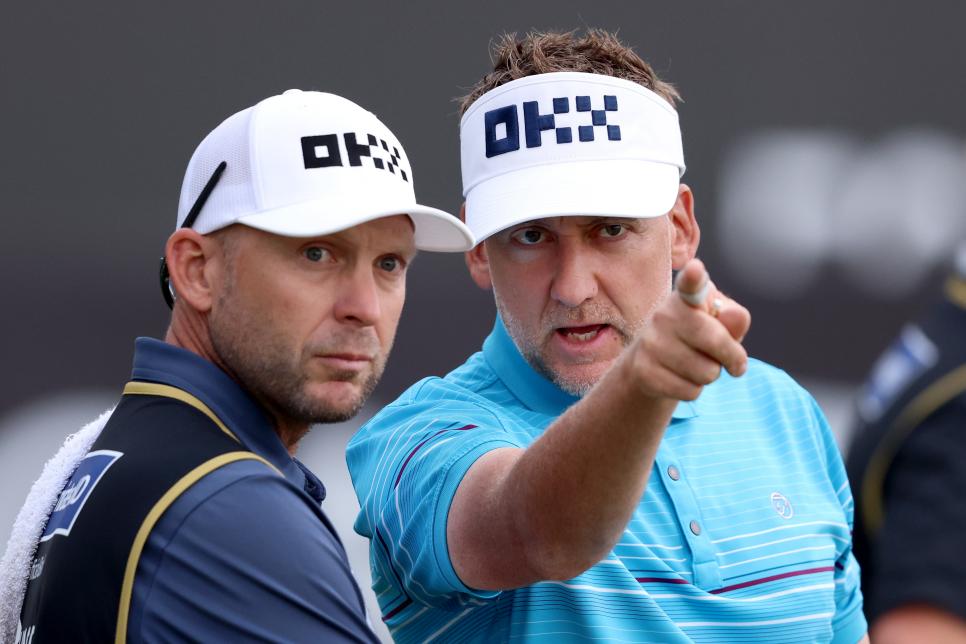Editor's Note: Golf Digest is recapping and analyzing every episode of the new Netflix golf series, Full Swing. In addition, Golf Digest editors Shane Ryan, Sam Weinman, and Alex Myers will discuss every episode in a limited-run podcast series, which you can find in our Local Knowledge feed.
Ep. 1: Frenemies | Ep. 2: Win or Go Home | Ep. 3: Money or Legacy | Ep. 4: Imposter Syndrome | Ep. 5: American Dreams | Ep. 6: Don’t Get Bitter, Get Better | Ep. 7: Golf is Hard | Ep. 8: Everything Has Led to This | Bonus: Final Recap & Interview with Chad Mumm, Full Swing Executive Producer
The Story
Episode Title: "Money or Legacy"
Tagline: Ian Poulter debates whether a lucrative LIV Golf contract is worth giving up his PGA Tour card—and facing the public scrutiny of his decision
Right off the bat, it's clear that this will be the flagship LIV episode, at least until we get to Rory in the series finale. News clips, audio, talking heads, and B-Roll footage serve as an explainer for LIV Golf, the connections to the Saudis, and the moral implications of it all. All of which brings us to Poulter, resplendent in his colorful pants, who has the strange/funny line "there is a lot of moving parts to this Poulter journey." Will he or won't he?
The Players Championship barely features in Full Swing, and we never see Cam Smith winning, but there's a cameo here to start our on-course action. Not so fast, though, because the minute we see it, it's taken away for a short recap of Poulter's life to date, culminating with an interviewer asking him if he enjoys playing in the Ryder Cup. "Does a bear shit in the woods?" he asks. "Is the Pope Catholic?" The reason they're bringing it up is clear; Poulter's almost 50, and giving up a PGA Tour or DP World Tour card is really not a big deal. But giving up the chance to captain the Ryder Cup? That's huge, and hits at the money vs. legacy episode title.
After more LIV background, featuring Phil Mickelson, Greg Norman, and Jay Monahan, we have a digression to examine Poulter's clothing choices, complete with insults from everyone in the golf world (plus his daughter and wife), and then...well, that's it for the Players Championship. Poulter finished T-33 there, though you wouldn't know it, because after a brief interlude with his son Luke, we're off to Austin and the Match Play, where he loses to Matt Fitzpatrick and Scottie Scheffler and fails to make the Masters.
It's all laughs on the plane ride home, and a slice of domestic life serves as a transition to the PGA Championship, where he misses the cut and expresses dissatisfaction with his game and his ability to handle "distractions." That means no U.S. Open, either, and the trajectory here is crystal clear . . . it ain't up.
"Working for free doesn't float my boat," he says, and it's all leading to the inevitable decision to move to LIV. When it happens, we see Poulter among the others at the LIV London event, with a montage of players being totally incapable and/or unwilling to answer any questions about the ethical implications of what they're doing. Brandel Chamblee makes the hard point that he's given up everything, including a Ryder Cup captaincy. When it comes to the question of "money or legacy," Poulter's choice is clear.

Netflix
The Good Stuff
—Finally, we have a charismatic personality around which to anchor an episode. By their own standards, Spieth and Thomas were incredibly buttoned up in Episode 1, and though the Koepka episode was interesting, 45 minutes was about the most time you wanted to spend with him. Poulter has an honest-to-God personality, whether you like that personality or not, and is entertaining to watch on a moment-to-moment basis. A particularly harsh review of the series in The Telegraph put it, "so irritatingly identikit are all these intense, dead-eyed, pampered young men in their billboard sportswear that by the time episode three comes around to focus on Ian Poulter, you are actually pleased to see him. Seriously." That review is brutal and I don't agree with all of it, but the sense of relief in meeting someone with a little character depth is spot-on.
—Poulter's big choice—stay or go—is documented very thoroughly and well here. It was interesting to see that the moral component never really entered into the equation for him; the choice was all about whether to tacitly admit that he couldn't compete at the top levels anymore, and weigh the payoff against the possibility of being blackballed from the Ryder Cup forevermore. Aside from Rory McIlroy, that's true of almost everyone you see in the whole series, and it speaks to both the isolation and single-mindedness of the professional golfer; for the most part, they seem almost totally unaware of geopolitics, and when asked to consider it by journalists or documentary filmmakers, their reactions vary between puzzled and irritated.
—Speaking of that, Netflix deserves credit for not slipping into the players' mindset. Along with all the contextual news footage and people like Brandel Chamblee making the context clear, they make a great (and maybe somewhat courageous?) choice to show the excruciating press conferences at LIV London, when players like Dustin Johnson laugh in something like disgust when a reporter has the audacity to ask about human rights violations, and others like Graeme McDowell, who should know better, be reduced to evasive platitudes like "we're just here to focus on the golf." Poulter doesn't get off easy either—he's made to account for his decision, and is asked a particularly brutal question: "Is there anywhere you wouldn't play if the money was right?" As in, are there any ethical lines you draw at all? He can't answer.
—That said, it never feels agenda-driven, which was something we were all looking out for, considering the close collaboration between Full Swing's producers and the PGA Tour. They let Poulter say his piece, explain his logic, and they don't cast him as a villain. He even has the last word, and you don't leave this episode thinking that Poulter is a bad guy.
—Likewise, this episode served as the explainer for LIV Golf in general, and with the short time they had to introduce the concept, I thought the presentation was as thorough as it could be, and mostly effective.
—The only overt editorial choice I noticed that might have gone beyond a clean presentation of the facts was one that made me laugh: For the LIV London event, the music playing over the montage of the various defectors was "Big Bag of Money" by G-Eyez.
—Brief as it was, they did a nice job presenting Poulter's role in the Ryder Cup. I still remember the visceral loathing my stepfather held for him early in his career, circa 2004, and I thought his description of himself was spot-on: "So, yeah, I've been that pain in the ass guy."

Chris Trotman/LIV Golf
The Duds
—To be honest, there's not much here—this was a strong episode, better than the two that came before it, with a unique and compelling personality at the center. Everything that follows is pure nitpick.
—We got yet another explanation of the cut. Granted, it is entirely possible that viewers are dipping in for a single episode, so there's no guarantee that anyone watching this has seen what came before, but still, at a certain point isn't it awkward to keep explaining the same concept?
—I have absolutely no evidence for this, but the extensive stuff with his son Luke and his burgeoning playing career seemed a little shoehorned in, and made me wonder if there was some sort of unwritten agreement between the parties there. All that said, I still enjoyed it, so I'm not losing sleep over it even if I'm right.
Reality Check
—The storytelling is at its most, uh...reckless?...when there's a lot of on-course action, or a forced contrast between two players. Because Ian Poulter stands alone here, and because the on-course stuff is limited to him basically failing, I thought Netflix stayed between the lines. And the LIV stuff is so fraught that they weren't about to take liberties or shortcuts there.
Stray Thoughts
—I cover the WGC-Match Play in Austin most years, and I remember last year circling the Poulter-Fitzpatrick match in the group stages and thinking there was absolutely no way Poulter would lose, regardless of form. He was a singles killer, and pretty much all I knew of Fitzpatrick is that he kept finding ways to lose at the Ryder Cup. He struck me as very talented, but very soft. Funny how a year can change your perspective.
—I'm a subtitles guy, and I thought it was interesting that while Dylan Dethier said "supposedly LIV is offering Ian Poulter tens of millions of dollars" in voiceover, the subtitles say "supposedly Live has a 40-million-dollar offer out to Ian Poulter." Make of that what you will. Late script change??
—More subtitle fun: When Dustin Johnson approaches Poulter and asks him if went to the F1 race, Poulter says yes, then DJ says he planned to go but didn't. According to the subtitles, Poulter next says, "nobody asked?" That struck me as a very funny dig, but upon review I'm almost certain he said, "couldn't be arsed?" As in, "couldn't be bothered?" Which was apparently hard to pick up for whatever human or AI bot was tasked with understanding that bit of British slang.
—Find someone who loves you the way Poulter loves when Netflix captures his caddie falling over.

Charles Laberge/LIV Golf
—Find someone who loves you the way Pat Perez loves knowing the exact Instagram and Twitter follower count of every single player in professional golf.
—Perez and Poulter both seem mad that Fowler never posts.
—Impossible not to laugh at Fitzpatrick saying "he almost broke my hand there!" after shaking Poulter's hand in Austin, despite the fact that it looked like a very normal, even brief handshake.
—The car shots were some of the best parts of the whole episode, but on rewatch I couldn't stop noticing that while he's driving and talking, Poulter gesticulates like crazy, often taking both hands off the wheel.
—I'm 100% adopting Poulter's commentary for his own bad shots: "You dirty, rotten pig."
Final Assessment
Chad Mumm, executive producer of this show, told me he signed Poulter after noticing that he seemed to be interested at the next table over in player dining while Mumm was having a meeting with Bryson DeChambeau's people. He was eager to participate, and clearly he didn't shy away once he made the decision to go to LIV. He's one of the game's more intriguing personalities, and his presence elevated the episode over the previous two. At the same time, Netflix did a solid job laying out the context for LIV, which is going to be very important for the rest of the series. Solid stuff all around.
